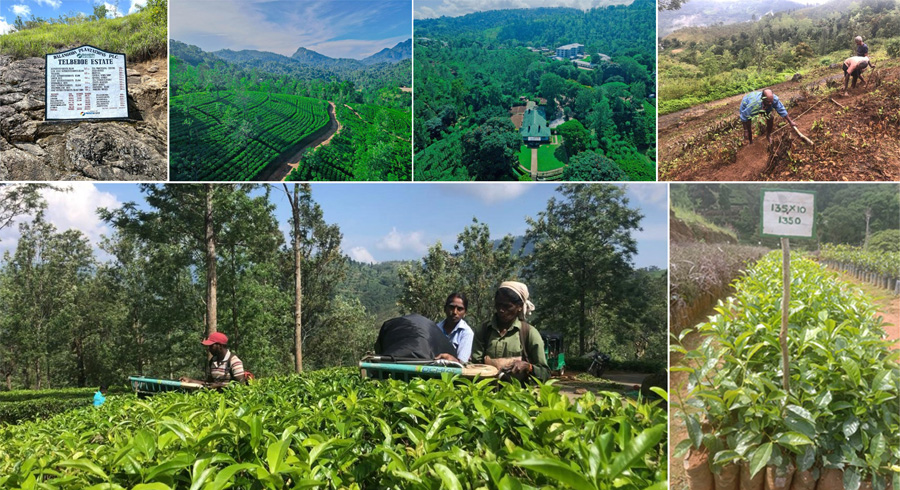Perched at an elevation of 1,036 metres above sea level, it forms part of the island’s historically significant tea belt.
Over the years, Telbedde has grown into a landmark estate, spanning 1,121 hectares, with 512 hectares under tea cultivation.
Known for producing medium-grown Orthodox Black Tea, the estate exemplifies both heritage and adaptation in Sri Lanka’s dynamic tea industry.
The name “Telbedde” is believed to have indigenous roots.
Oral history suggests it derives from “wonder trees” that once grew in the area, trees whose oil was used for lighting.
These were later cut down for the matchstick industry.
This connection to natural resources and rural ingenuity adds in another layer to the estate’s unique identity.
Today, Telbedde is managed under Balangoda Plantations PLC, part of Melstacorp.
Telbedde’s tea fields are primarily of Assam and Manipuri jat varieties, known for their robust leaf and well-rounded flavour profiles.
Initially classified as a high-grown estate, Telbedde was re-designated as medium-grown in June 1959.
This shift reflected both its geographical reality and its commercial strategy, enabling continued exports to traditional markets such as the United Kingdom.
One of Telbedde’s greatest strengths lies in its sustainable agricultural practices.
The estate adopts a medium plucking standard, a compromise between the fine plucking method that enhances quality.
This medium approach balances all critical aspects, the appearance and market value of the made tea, the productivity of each acre and the overall cost of production.
Plucking rounds are typically done every 7 to 10 days, depending on elevation and field conditions.
As with most large tea estates, pruning is an integral part of field maintenance.
Telbedde follows a structured pruning cycle, generally every three years.
This ensures that bushes retain their vegetative status and are able to produce new shoots at optimal levels.
Tools such as pruning knives, pruning machines and hand saws are used for precise bush sanitation.
The estate also practices slope pruning and field-specific pruning cycles, especially in response to past challenges such as blister blight outbreaks in the 1940s.
Historically, transporting leaf from the fields to the factory required a mix of traditional and ingenious solutions.
In earlier decades, plucked leaf was carried by workers or transported by bullock carts.
Later, motor lorries took over, dropping leaf at central points from which they were moved by wire shoots which is a suspended cable system that sent the leaf downhill to the factory.
However, this system became obsolete following a fire that destroyed the factory in September 1945.
A new factory was later commissioned, streamlining production and modernizing the estate’s workflow.
In April 2020, Telbedde Estate made headlines by achieving a record price of Rs. 1,250 per kilogram for a liquoring FBOP grade at the Colombo Tea Auction, highlighting its continuing relevance and premium status in the market.
Community, Sustainability and Cultural Legacy
Home to nearly 5,000 people, including workers and their families, the estate provides both employment and infrastructure to support daily life.
The workforce includes over 540 workers, both resident and non-resident, supported by a staff of 41 and four executives.
Employment at Telbedde extends beyond the fields.
The estate strengthens local entrepreneurship by supporting home gardening and offering cooperative society loans for self-employment ventures.
This helps workers supplement their income and encourages economic activity within surrounding villages.
Telbedde is known for promoting eco-friendly pest control methods and soil conservation techniques.
In contrast to past industry practices that involved toxic weedicides, Telbedde today focuses on safety and sustainability while training workers regularly on good agricultural practices and prioritizing biodiversity.
Partnerships with institutions such as Uva Wellassa University have opened doors for students to gain practical training in agricultural science and estate management.
These collaborations help bridge theory and practice and also inspire innovation in sustainable plantation practices.
Telbedde Estate was recently recognized by the Tea Exporters Association as one of the winning tea producers from the Uva region at the 2025 Outstanding Tea Producers competition.
This honor highlights Telbedde’s continued commitment to quality and excellence, reinforcing its place as a leading name in Sri Lanka’s tea industry.
Over the years, Telbedde has consistently set record prices at the Colombo Tea Auctions, with milestones such as Rs. 1,350 per kg in March 2022, Rs. 1,950 per kg later that same month, and an all-time high of Rs. 2,500 per kg in April 2022 for its BOP1 grade in the “Uva Medium” category.
In addition to these market achievements, Telbedde has also received international acclaim, including the Gold Medal at the 2nd World Black Tea Quality Evaluation Contest (2022, China) and the Gold Award at the 8th Asia-Pacific Tea Competition (2023, Beijing) for its OP1 grade.
These achievements both at home and abroad, highlight the estate’s reputation for producing premium teas and reflect its contribution to upholding Sri Lanka’s proud tea legacy.
Sustaining Heritage in a Modern Era
While it remains deeply rooted in Sri Lanka’s tea heritage, it also continues to innovate, balancing traditional practices with modern production, environmental care and social responsibility.
Telbedde represents a legacy, where generations of knowledge, labour and land stewardship come together to produce world-class tea.
As the global tea landscape evolves, Telbedde stands prepared to grow sustainably into the future.






















